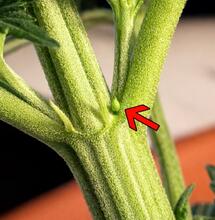Cannabis Can Help Control Opioid Abuse, Users Say

Cannabis could reduce and help stop entirely opioid use, a new piece of research says. One of the most powerful therapeutic qualities of cannabis is its use as a pain-relieving agent, making it one of the most convenient substitutes for opioid drugs. The latest study on cannabis and opioids, conducted by researchers with the University of Southern California, further shows that cannabis can help with withdrawal symptoms from opioid use, including cravings and anxiety.
Opioid overdose deaths are on the rise in the U.S. in the last decade. The worrying trend is significantly driven by the easy access to drugs such as fentanyl on the black market.
Researchers affiliated with the University of Southern California (USC) interviewed 30 people who were using opioids and cannabis and injecting drugs. Study participants were recruited from a methadone clinic and a syringe exchange program in Los Angeles.
The study was recently published in the journal Drug and Alcohol Dependence Reports. It was funded by the National Institute on Drug Abuse, which traditionally has supported research on cannabis harms instead of any of its health benefits.
Cannabis Can Help Opioid Users Develop Reduced Opioid Use Patterns
The PWID (people who inject drugs) interviewees described that cannabis co-use was helpful in developing patterns of reduced opioid use. There were several different ways in how it helped. Cannabis assisted them cease opioid use or adhere to opioid use disorder treatment by managing withdrawal symptoms. Cannabis also helped with overall withdrawal symptoms management, and led to decreased opioid use as they had easy access to the plant medicine.
The lead author of the study is Sid Ganesh, a PhD student at USC’s medical school. According to the researcher, the majority of interviewees in her study were people with unstable housing and low incomes, below $2,100 per month. In other words, those who abuse opioid drugs are often vulnerable populations and “you need to understand what’s going on in people’s lives,” she said, The Guardian reported.
Together with her colleagues, Ganesh found that cannabis could help drug users stay clean during some of the most critical stages of quitting and reducing opioid use. The researchers were also well aware that cannabis isn’t by definition the best drug available to aid with opioid addiction. But it was what study participants were able to get most easily.
The interviewees described how cannabis helped them cope with withdrawal symptoms, such as cravings and anxiety during and post withdrawal.
“When you’re smoking weed it gets you over the hump and that urge to get high for the first time. That’s what’s so special about weed,” said one participant. Another described using cannabis to cut down on fentanyl while waiting on a prescription for suboxone, which helps people quit opioids, The Guardian reported.
Cannabis Can Help, But the Opioid Crisis is Far from Over
Opioid overdose mortality rates have been reaching new heights during the last decade, although last year was the first annual decrease in drug overdose deaths observed since 2018. Over 107,000 Americans died of a drug overdose in 2023, and roughly 75 percent of the fatalities involved the use of opioids, according to the Centers for Disease Control and Prevention. The figure represents a three-percent decrease from the previous year, 2022.
It’s not news that as a soft drug, cannabis can greatly support those struggling to cease opioids. Dronabinol, which is a synthetic form of THC, has been found in earlier research to be particularly successful at pacifying withdrawal symptoms in patients undergoing detoxification programs with naltrexone injections.
Cannabis is also a great substitute for prescription pain medications. A recent survey data compiled by researchers with the Ohio State University’s Moritz College of Law, showed that nearly three-quarters of respondents say that marijuana reduces their need for prescription pain medications. Roughly 3,500 cannabis users were included in the survey, with 77.55% agreeing that the use of marijuana helped them mitigate their urge to take prescription pain-killers. Twenty-seven percent of respondents also said that weed lessened their use of other illicit substances.
Those who have recently quit or cut down on opioids represent the most vulnerable group, with the highest risk of overdose because of the lowered tolerance level when they go back to the hard drugs.
Health experts are aware that cannabis is not a universal solution that could help all opioid drug users. It might work for some, but not for everyone. To truly evaluate the success rate of cannabis in treating opioid use disorders, researchers do need to run larger-scale clinical trials. It’s definitely something worthy of further investigation. Funding both research and treatment programs could save lives.
Also read on Soft Secrets:
- Medical Cannabis and Opioid Dosages: Study













